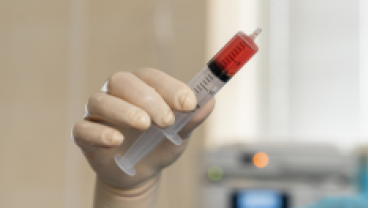About Paediatric Haematology and BMT
What is Pediatric Hematology
Pediatric hematology focuses on diagnosing and treating children affected by blood disorders. These disorders include common conditions like anemia, infection, blood clotting disorders, leukemia, and rare genetic disorders such as hemophilia or sickle cell disease. Understanding pediatric hematology is essential for pediatricians, hematologists, and healthcare professionals to facilitate timely diagnosis and appropriate treatment of these conditions.
Understanding Pediatric Hematologic Disorders
- Anemia: Anemia is one of the most common blood disorders in children. It occurs due to a deficiency of red blood cells or hemoglobin caused by nutritional deficiencies, chronic diseases, or genetic conditions like thalassemia.
- Thrombocytopenia: This condition is marked by a low platelet count, leading to impaired blood clotting and an increased risk of bleeding. Causes include the destruction of platelets and genetic disorders.
- Hemophilia: This is a rare genetic disorder characterized by a deficiency in clotting factors. Children with hemophilia experience prolonged bleeding even after minor cuts or injuries.
- Sickle Cell Disease: Sickle cell disease is a genetic disorder wherein abnormal hemoglobin distorts red blood cells into a sickle shape. The cells die early, leading to a shortage of healthy red blood cells, blocking blood flow, and causing pain, anemia, and organ damage.
- Thalassemia: Thalassemia is a group of genetic disorders characterized by reduced or no hemoglobin production, leading to anemia and other complications.
- Leukemia: Leukemia is a cancer affecting the bone marrow and the blood. It is caused by abnormal proliferation of immature white blood cells, interfering with the production of normal blood cells and compromising the body’s ability to fight infections.
Diagnostic Procedures in Pediatric Hematology
The diagnostic procedures in pediatric hematology enable healthcare professionals to identify the underlying cause of symptoms and develop appropriate treatment plans. These tests include:
- Complete Blood Count (CBC): A CBC is a routine blood test that provides essential information about the number and different types of blood cells, including red blood cells, white blood cells, and platelets. Abnormalities in cell counts indicate various blood disorders such as anemia, infection, or leukemia.
- Peripheral Blood Smear: A peripheral blood smear involves examining a thin layer of blood under a microscope to assess blood cells’ morphology (shape and size). This test helps diagnose abnormalities such as sickle cell disease, thalassemia, and certain types of leukemia.
- Bone Marrow Aspiration and Biopsy: Bone marrow aspiration and biopsy are invasive procedures used to obtain samples of bone marrow for examination. A needle is inserted into the bone marrow space during bone marrow aspiration to withdraw a liquid sample. At the same time, a biopsy involves removing a small piece of bone and marrow tissue for analysis. These tests help diagnose conditions such as leukemia, lymphoma, and certain types of anemia.
- Genetic Testing: Genetic testing analyzes a patient’s DNA to identify specific genetic mutations related to inherited blood disorders such as hemophilia, sickle cell disease, and thalassemia.
- Coagulation Studies: Coagulation studies assess the clotting ability of the blood and are crucial in diagnosing bleeding disorders such as hemophilia and von Willebrand disease.
- Flow Cytometry: Flow cytometry analyzes the characteristics of blood cells, including their size, shape, and surface markers. It is commonly used to diagnose and classify hematologic malignancies such as leukemia and lymphoma.
- Imaging Studies: Imaging studies such as X-rays, ultrasound, computed tomography (CT), and magnetic resonance imaging (MRI) are used to detect the presence of organomegaly (enlarged organs) or lymphadenopathy (swollen lymph nodes) associated with some blood disorders.
- Specialized Tests: Based on the diagnosis, additional specialized tests may be performed, including hemoglobin electrophoresis, enzyme assays, and immunohistochemistry.
Treatment Approaches
- Blood Transfusion: Blood transfusion is recommended for patients with severe anemia or bleeding disorders to replenish the deficient blood components.
- Medication: Pharmacological interventions such as iron supplementation are prescribed for anemia. Clotting factor replacement therapy is given for hemophilia.
- Bone Marrow Transplantation: Bone marrow transplantation is a treatment option for genetic disorders like severe combined immunodeficiency (SCID) or aplastic anemia.
- Gene Therapy: Gene therapy treats genetic blood disorders by correcting underlying genetic mutations.
Timely diagnosis, appropriate management, and ongoing research efforts are crucial in improving outcomes and quality of life for children affected by hematological disorders. Collaborative efforts among healthcare professionals, researchers, and policymakers are essential to address the challenges and advance the field of pediatric hematology. Fortis, with its multidisciplinary approaches to diagnosis, treatment, and ongoing research efforts, provides customized and advanced care for children and adolescents who have blood disorders or cancers.
Our Team of Experts
View allMedical Procedures for Paediatric Haematology and BMT
View allOur patient’s stories
View allRelated Specialities
Other Specialities
-
Explore Hospitals for Paediatric Haematology and BMT
Fortis Cancer Institute, Defence Colony, New Delhi Fortis Escorts Hospital, Faridabad Fortis Hospital BG Road Bangalore Fortis Hospital, Kalyan, Mumbai Fortis Hospital, Mulund, Mumbai Fortis Memorial Research Institute, Gurgaon Fortis Hospital, Shalimar Bagh, New Delhi Fortis Hospital, Noida Fortis Escorts Heart Institute, New Delhi Fortis Flt. Lt. Rajan Dhall Hospital, Vasant Kunj Hiranandani Fortis Hospital, Vashi, Mumbai -
Explore Doctors for Paediatric Haematology and BMT by Hospital
Doctors in Fortis Cancer Institute, Defence Colony, New Delhi Doctors in Fortis Escorts Hospital, Faridabad Doctors in Fortis Hospital BG Road Bangalore Doctors in Fortis Hospital, Kalyan, Mumbai Doctors in Fortis Hospital, Mulund, Mumbai Doctors in Fortis Memorial Research Institute, Gurgaon Doctors in Fortis Hospital, Shalimar Bagh, New Delhi Doctors in Fortis Hospital, Noida Doctors in Fortis Escorts Heart Institute, New Delhi Doctors in Fortis Flt. Lt. Rajan Dhall Hospital, Vasant Kunj Doctors in Hiranandani Fortis Hospital, Vashi, Mumbai

























